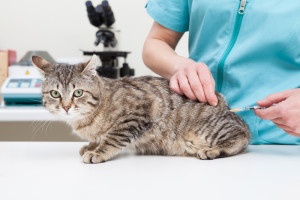Vaccinations
Vaccinations
 We know that vaccination, while common, is worth careful consideration. We are as concerned as you are about safe, effective, and appropriate levels of vaccination, individualized for your family member. At Bernardo Heights Veterinary Hospital, we follow vaccine guidelines developed by the American Animal Hospital Association (AAHA), the American Veterinary Medical Association (AVMA), the American Association of Feline Practitioners (AAFP), and the California Department of Public Health. These guidelines mean that we only recommend industry recognized essential, safe, and effective vaccines and vaccine protocols. As such, careful thought and consideration has gone into the selection of the particular vaccines that we purchase and to the vaccine protocols that we follow for dogs and cats, in all stages of life, and particular to this geographic area. Compared to a vaccine clinic, where price of the vaccine is usually primary consideration, here at BHVH when we purchase vaccines the primary consideration is safety and effectiveness of the product that will be used. Because our clients as a large group agree with this philosophy, we are able to offer high quality vaccines at very affordable rates.
We know that vaccination, while common, is worth careful consideration. We are as concerned as you are about safe, effective, and appropriate levels of vaccination, individualized for your family member. At Bernardo Heights Veterinary Hospital, we follow vaccine guidelines developed by the American Animal Hospital Association (AAHA), the American Veterinary Medical Association (AVMA), the American Association of Feline Practitioners (AAFP), and the California Department of Public Health. These guidelines mean that we only recommend industry recognized essential, safe, and effective vaccines and vaccine protocols. As such, careful thought and consideration has gone into the selection of the particular vaccines that we purchase and to the vaccine protocols that we follow for dogs and cats, in all stages of life, and particular to this geographic area. Compared to a vaccine clinic, where price of the vaccine is usually primary consideration, here at BHVH when we purchase vaccines the primary consideration is safety and effectiveness of the product that will be used. Because our clients as a large group agree with this philosophy, we are able to offer high quality vaccines at very affordable rates.
Additionally, we ONLY administer adjuvant free feline vaccines. It is highly suspected that adjuvanted feline vaccines do carry an increased risk for inducing feline vaccine site sarcomas, so while there is not a complete consensus in the veterinary community, many studies in peer reviewed scientific journals and many veterinary specialists recommend using only adjuvant free vaccines in felines to reduce these risks. We follow these recommendations, again acting as the best possible advocate for your pet and your family's health. For more information see the feline vaccine guidelines set forth on the AAFP website.
Vaccinations that are non-core
The American Animal Hospital Association (AAHA) Canine Vaccine Task Force sets forth recommendations for canine vaccinations. Some vaccines are considered core (all dogs should receive), and some are considered non-core. Even though the vaccine may be non-core according to Canine Vaccine Task Force, they still may recommend it if the disease/pathogen is present in the area, and a vaccine exists that is safe and effective. For San Diego county two non-core optional vaccines that fit into this category are Leptospirosis and Rattlesnake vaccination. Please read the following for details on each, and take special note about the fact that the Rattlesnake vaccination does not have definitive proof of effectiveness, but is still recommended due to the potential benefit.
Leptospirosis
Leptospirosis is present here. In 90% of affected pets they just develop flu like symptoms and it passes. But in 10% they develop kidney and/or liver failure, they require intensive care, and not all pets survive. They are exposed to it through urine. The typical exposure route for pets is urine from wildlife (including coyotes) in the environment, movement of that urine by rain storms, and exposure to bodies of water (any size) that may be infected. Thus even animals that are not in direct contact with wildlife can be exposed. The pets in areas with significant urban-wildlife interface (e.g. San Diego county) are at higher risk. The initial vaccination requires two vaccines separated by 3-4 weeks, with annual boosters thereafter. Keep in mind this used to NOT be an optional vaccine - it was part of the core vaccines. It has since been removed from core vaccines, but we are seeing some cases of Leptospirosis, and it is life threatening, so many veterinarians in areas where the disease is present are recommending it. The vaccine itself is safe as far as the major adverse vaccine risks, but is likely to cause pain at the injection site (L shoulder) and a day or two of mild malaise.
Rattlesnake Vaccine:
- Because southern California is a high risk region for rattlesnake exposure we do recommend it for animals that may encounter snakes.
- There is not a consensus in the veterinary community as to the benefit of rattlesnake vaccine: at worst it has no benefit and at best it reduces the severity of problems associated with a bite.
- The American Animal Hospital Association (AAHA) Canine Vaccine Task Force currently does not recommend for or against the rattlesnake vaccination, as there currently is not field efficacy or experimental data available in DOGS at this time. The Task Force and the AVMA do realize though that some vaccines, including rattlesnake, while not considered "core", may in fact provide some benefit and there may be validity in administration in some individuals. The Task Force does state that when administered, owners must be advised that "vaccination does not eliminate the need to treat individual dogs subsequent to envenomation."
- The vaccine has a large potential benefit and few associated risks.
- The main benefit is that dogs bitten by rattlesnakes may suffer a less severe reaction and thus prognosis may be improved with appropriate treatment.
- Typically, animals get two initial vaccines and a booster every year.
It's important to consult with us about the unique risks of living in our region. We will be happy to discuss the benefits of protecting your pet with vaccinations, as well as, provide you with information on the required vaccinations for your pet.
It is our goal to provide the highest level of care for your pet, and vaccination is an integral part of your pet's overall health. Please contact us today if you have any questions or concerns about your pet's vaccination.
.png?width=4092&height=2500&name=BHVH_Logo_white%20(2).png)
